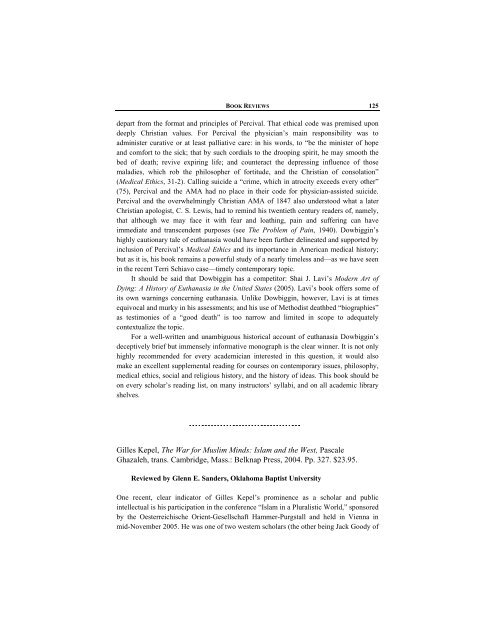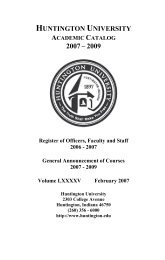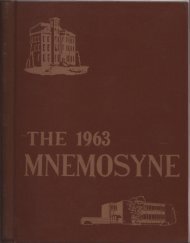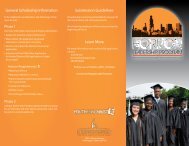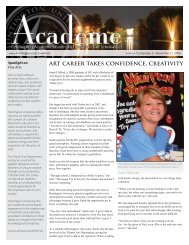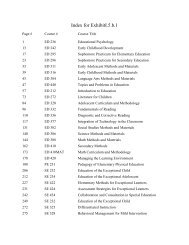Gillian Clark, Christianity and Roman Society - Huntington University
Gillian Clark, Christianity and Roman Society - Huntington University
Gillian Clark, Christianity and Roman Society - Huntington University
Create successful ePaper yourself
Turn your PDF publications into a flip-book with our unique Google optimized e-Paper software.
BOOK REVIEWS 125<br />
depart from the format <strong>and</strong> principles of Percival. That ethical code was premised upon<br />
deeply Christian values. For Percival the physician’s main responsibility was to<br />
administer curative or at least palliative care: in his words, to “be the minister of hope<br />
<strong>and</strong> comfort to the sick; that by such cordials to the drooping spirit, he may smooth the<br />
bed of death; revive expiring life; <strong>and</strong> counteract the depressing influence of those<br />
maladies, which rob the philosopher of fortitude, <strong>and</strong> the Christian of consolation”<br />
(Medical Ethics, 31-2). Calling suicide a “crime, which in atrocity exceeds every other”<br />
(75), Percival <strong>and</strong> the AMA had no place in their code for physician-assisted suicide.<br />
Percival <strong>and</strong> the overwhelmingly Christian AMA of 1847 also understood what a later<br />
Christian apologist, C. S. Lewis, had to remind his twentieth century readers of, namely,<br />
that although we may face it with fear <strong>and</strong> loathing, pain <strong>and</strong> suffering can have<br />
immediate <strong>and</strong> transcendent purposes (see The Problem of Pain, 1940). Dowbiggin’s<br />
highly cautionary tale of euthanasia would have been further delineated <strong>and</strong> supported by<br />
inclusion of Percival’s Medical Ethics <strong>and</strong> its importance in American medical history;<br />
but as it is, his book remains a powerful study of a nearly timeless <strong>and</strong>—as we have seen<br />
in the recent Terri Schiavo case—timely contemporary topic.<br />
It should be said that Dowbiggin has a competitor: Shai J. Lavi’s Modern Art of<br />
Dying: A History of Euthanasia in the United States (2005). Lavi’s book offers some of<br />
its own warnings concerning euthanasia. Unlike Dowbiggin, however, Lavi is at times<br />
equivocal <strong>and</strong> murky in his assessments; <strong>and</strong> his use of Methodist deathbed “biographies”<br />
as testimonies of a “good death” is too narrow <strong>and</strong> limited in scope to adequately<br />
contextualize the topic.<br />
For a well-written <strong>and</strong> unambiguous historical account of euthanasia Dowbiggin’s<br />
deceptively brief but immensely informative monograph is the clear winner. It is not only<br />
highly recommended for every academician interested in this question, it would also<br />
make an excellent supplemental reading for courses on contemporary issues, philosophy,<br />
medical ethics, social <strong>and</strong> religious history, <strong>and</strong> the history of ideas. This book should be<br />
on every scholar’s reading list, on many instructors’ syllabi, <strong>and</strong> on all academic library<br />
shelves.<br />
Gilles Kepel, The War for Muslim Minds: Islam <strong>and</strong> the West, Pascale<br />
Ghazaleh, trans. Cambridge, Mass.: Belknap Press, 2004. Pp. 327. $23.95.<br />
Reviewed by Glenn E. S<strong>and</strong>ers, Oklahoma Baptist <strong>University</strong><br />
One recent, clear indicator of Gilles Kepel’s prominence as a scholar <strong>and</strong> public<br />
intellectual is his participation in the conference “Islam in a Pluralistic World,” sponsored<br />
by the Oesterreichische Orient-Gesellschaft Hammer-Purgstall <strong>and</strong> held in Vienna in<br />
mid-November 2005. He was one of two western scholars (the other being Jack Goody of


